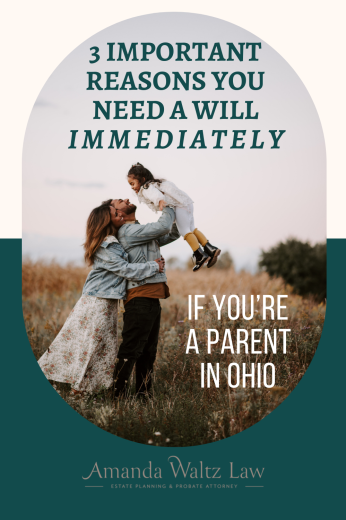
3 Important Reasons You Need a Will Immediately if You’re a Parent in Ohio
A last will and testament is a legally-binding document that details all your wishes in the event you pass away. According to caring.com, only 32.9% of Americans have a will. That means 2 out of every 3 adults do not currently have a will.
There are numerous reasons you need a will, but it’s especially important if you’re a parent. Nobody wants to think about what life may be like if you’re no longer here. The topic is uncomfortable, sad, and a little morbid. However, not having a will in place after you die (also called dying “intestate”) means that all decisions related to your children, your assets, and your property, are left to local courts and the state’s inheritance laws.
I am a mother to four beautiful children and I want nothing but the best for each of them while my husband and I raise them. That feeling is even more relevant and exponential in the heartbreaking event that we are not here to see them grow up. I have been practicing law in Ohio since 2016 and a proud member of the Delphos, Ohio community since 2020. I am proud to advise my community on the law, provide options, and help them work through the best plan for themselves and their family.
Now let’s talk about the most important reasons you need a will if you’re a parent.
1. Choose Who Will Care for Your Children

Arguably the #1 most important reason you need a will as a parent is to determine who is best suited to raise your sweet child(ren) if you’re no longer here. You don’t want to leave this up to a court system, which is what would happen if you don’t have a will. It should be your decision because you know your children and you know what’s best for them.
Can you imagine for a moment who in your life a judge may decide is fit to care for your children? How would other members of your family react? Not to mention that they would all be grieving the loss of you, so emotions are high. It could potentially cause a lot of stress on your children and your friends and family. Especially if you have a complicated family dynamic. When it’s explained that the decision was made by you, it’s much easier to accept. And you can rest easy knowing they are in good hands.
Some things to consider when choosing a guardian in your will:
- Will this person raise your children with similar morals and methods as you? No one can raise your children quite like you. They’re your babies. But you’ll want to imagine if this person could raise them in a way that would make you proud.
- Is this person stable? I’m talking financially and emotionally. It will be a challenging time if this situation becomes reality. You’ll want to know this guardian is strong enough to get through it and make a good life for your children.
- Consider their age. You may want to name your parents as the guardian. That could be a good decision for right now, but think about how old they’ll be when your youngest is in high school. Will they still be in good health?
- It’s not set in stone. As long as you are living, you can always come back to your will and make changes.
2. Determine Who Will Receive Your Assets and Property – and Who Does Not

You may not feel like you have a lot of assets at this time. Think about the money in your bank account, your life insurance, any stocks or investments, your home, your vehicles, any valuable jewelry, or other material goods, they do add up. Moreover, having them sorted out in a will if you were to die, would undoubtedly save your family a lot of time, stress, and money. It could cause a lot of disputes among your loved ones if your assets and property are left up for grabs.
While I would consider pets part of the family, legally, your pets are considered property. Having instructions on who you’d like to care for your pet(s) would ensure they are well-loved, too. This can but doesn’t have to be the same person you choose as guardian of your children. It’s also possible to allocate some of your monetary assets to assist with the care of your pet.
Another valuable benefit to having a last will and testament is that you can include any person that should not receive an inheritance from your assets or property. This could be an ex-spouse or estranged family member. A court system wouldn’t be aware of any disputes or bad blood, so the best way to ensure that anything you leave behind goes to the people you cherish the most is to have it written in your will.
3. Name Your Executor

When you create your will, you’ll choose an executor. This person will be responsible for carrying out your final wishes. It’s an important role. They are your voice after you can no longer speak. According to research done by Estateexec.com, it takes an executor roughly 570 hours of effort over 16 months on average to settle an estate.
These responsibilities can include filing your will with the court, paying off your debts, closing credit cards, overseeing the distribution of your assets according to the wishes established in your will, and more. It doesn’t require special knowledge or qualifications, however, you will want this person to be organized and responsible. Put diligent thought into this and choose someone you trust. If you struggle to pick one person from your personal life, you can always appoint a professional such as an attorney or your accountant.
Tomorrow is not promised. None of us are invincible. You don’t want to realize you need a will after it’s too late. This is just one extra way to take care of your children and ensure their safety and wellbeing should anything ever happen to you. A will doesn’t take effect until after your death, so nothing will currently change with your assets or guardianship while you’re alive. And you can continue to change it as your life circumstances change.
It’s easy to procrastinate. You’re busy, you don’t want to think about it, I get that. But, it’s also easy to set up your will and you will gain peace of mind after it’s in place. I’m here to walk you through every step of the process.


The Comments
Attorney-Client Privilege in Ohio, Explained
[…] is one that I encounter frequently. For example, a husband and wife use the same lawyer for their estate planning, they are considered joint clients and the communication is privileged for both […]
What is the Estate Planning Process? - Amanda Waltz Law, LLC
[…] but also determines who will care for minor children and their assets upon the parent’s passing. (In this post, I talk about some important reasons you need a will as a parent of young children.)During this […]
Avoid These 8 Common Mistakes When Writing Your Will - Amanda Waltz Law, LLC
[…] you are a parent, choosing who will care for your children is one of the top reasons you need a will. Failing to designate guardians can result in emotional custody battles or court-appointed […]
A Guide to Updating Your Estate Plan After Major Life Changes - Amanda Waltz Law, LLC
[…] Changes in Guardianship: If you have young children, updating your choice of guardians in case of your untimely passing is essential.Failing to update guardianship designations can result in your children being cared for by someone you would not have chosen. This can cause emotional distress for your children and legal complications for your family.This is one of the most important reasons parents of young children need an updated estate plan in place. […]